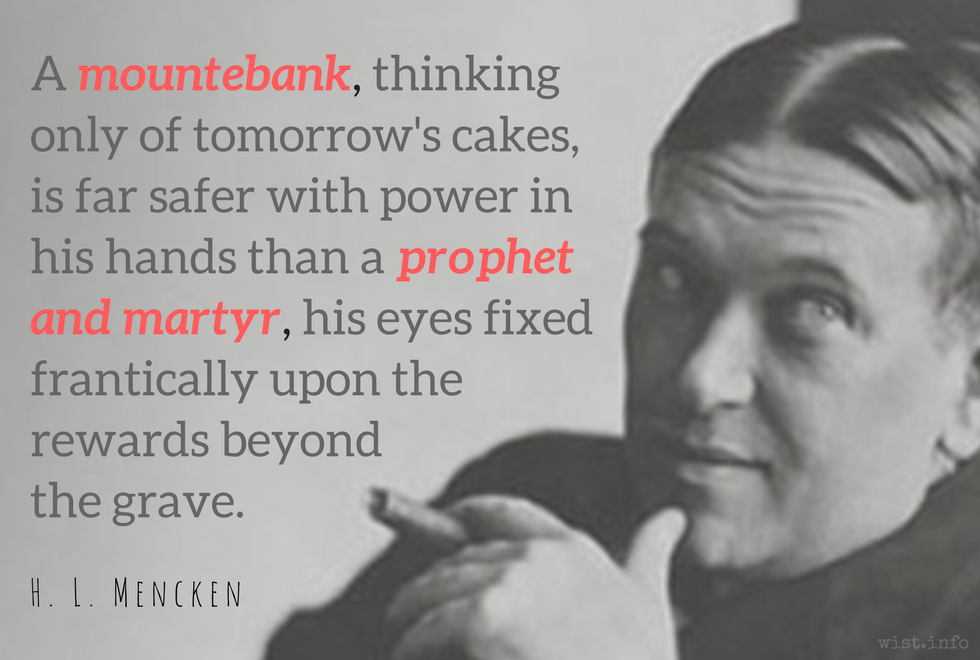Nor need we be surprised that men so often embrace almost any doctrines, if they are proclaimed with a voice of absolute assurance. In a universe that we do not understand, but with which we must in one way or another somehow manage to deal; and aware of the conflicting desires that clamorously beset us, between which we must choose, and which we must therefore manage to weigh, we turn in our bewilderment to those who tell us that they have found a path out of the thickets and possess the scales by which to appraise our needs. Over and over again such prophets succeed in converting us to unquestioning acceptance; there is scarcely a monstrous belief that has not had its day and its passionate adherents, so eager are we for safe footholds in our dubious course.
Learned Hand (1872-1961) American jurist
Speech (1955-01-29), “A Fanfare for Prometheus,” American Jewish Committee annual dinner, New York City
(Source)
Quotations about:
prophet
Note not all quotations have been tagged, so Search may find additional quotes on this topic.
There comes now and then a bolder spirit, I should rather say, a more surrendered soul, more informed and led by God, which is much in advance of the rest, quite beyond their sympathy, but predicts what shall soon be the general fullness; as when we stand by the seashore, whilst the tide is coming in, a wave comes up the beach far higher than any foregoing one, and recedes; and for a long while none comes up to that mark; but after some time the whole sea is there and beyond it.
Ralph Waldo Emerson (1803-1882) American essayist, lecturer, poet
“Lecture on the Times,” Boston (1841-12-02)
(Source)
Just as every conviction begins as a whim so does every emancipator serve his apprenticeship as a crank. A fanatic is a great leader who is just entering the room.
The principle is surely not new in the world: everyone ought to know by this time that a mountebank, thinking only of tomorrow’s cakes, is far safer with power in his hands than a prophet and martyr, his eyes fixed frantically upon the rewards beyond the grave.
H. L. Mencken (1880-1956) American writer and journalist [Henry Lewis Mencken]
“What I Believe,” sec. 2, Forum and Century (Sep 1930)
(Source)
Those who are destitute of philosophy may be compared to prisoners in a cave, who are only able to look in one direction because they are bound, and who have a fire behind them and a wall in front. Between them and the wall there is nothing; all that they see are shadows of themselves, and of objects behind them, cast on the wall by the light of the fire. Inevitably they regard these shadows as real, and have no notion of the objects to which they are due. At last, some man succeeds in escaping from the cave to the light of the sun; for the first time he sees real things, and becomes aware that he had hitherto been deceived by shadows. If he is the sort of philosopher who is fit to become a guardian, he will feel it is his duty to those who were formerly his fellow prisoners to go down again into the cave, instruct them as to the truth, and show them the way up. But he will have difficulty in persuading them, because, coming out of the sunlight, he will see shadows less clearly than they do, and will seem to them stupider than before his escape.
Then I heard the voice of the Lord saying: “Whom shall I send? Who will be our messenger?” I answered, “Here I am, send me.”
The Bible (The Old Testament) (14th - 2nd C BC) Judeo-Christian sacred scripture [Tanakh, Hebrew Bible], incl. the Apocrypha (Deuterocanonicals)
Isaiah 6: 8 [JB (1966)]
(Source)
Alternate translations:Also I heard the voice of the Lord, saying, Whom shall I send, and who will go for us? Then said I, Here am I; send me.
[KJV (1611)]Then I heard the Lord say, “Whom shall I send? Who will be our messenger?”
I answered, “I will go! Send me!”
[GNT (1976)]I then heard the voice of the Lord saying: 'Whom shall I send? Who will go for us?' And I said, 'Here am I, send me.'
[NJB (1985)]Then I heard the voice of my Sovereign saying, “Whom shall I send? Who will go for us?” And I said, “Here am I; send me.”
[JPS (1985)]Then I heard the voice of the Lord saying, “Whom shall I send, and who will go for us?” And I said, “Here am I; send me!”
[NRSV (1989 ed.)]
Be on your guard against false prophets; they come to you looking like sheep on the outside, but on the inside they are really like wild wolves. You will know them by what they do. Thorn bushes do not bear grapes, and briers do not bear figs. A healthy tree bears good fruit, but a poor tree bears bad fruit. A healthy tree cannot bear bad fruit, and a poor tree cannot bear good fruit. And any tree that does not bear good fruit is cut down and thrown in the fire. So then, you will know the false prophets by what they do.
[Προσέχετε ἀπὸ τῶν ψευδοπροφητῶν, οἵτινες ἔρχονται πρὸς ὑμᾶς ἐν ἐνδύμασιν προβάτων, ἔσωθεν δέ εἰσιν λύκοι ἅρπαγες. ἀπὸ τῶν καρπῶν αὐτῶν ἐπιγνώσεσθε αὐτούς. μήτι συλλέγουσιν ἀπὸ ἀκανθῶν σταφυλὰς ἢ ἀπὸ τριβόλων σῦκα; οὕτως πᾶν δένδρον ἀγαθὸν καρποὺς καλοὺς ποιεῖ, τὸ δὲ σαπρὸν δένδρον καρποὺς πονηροὺς ποιεῖ. οὐ δύναται δένδρον ἀγαθὸν καρποὺς πονηροὺς ποιεῖν οὐδὲ δένδρον σαπρὸν καρποὺς καλοὺς ποιεῖν. πᾶν δένδρον μὴ ποιοῦν καρπὸν καλὸν ἐκκόπτεται καὶ εἰς πῦρ βάλλεται. ἄρα γε ἀπὸ τῶν καρπῶν αὐτῶν ἐπιγνώσεσθε αὐτούς.]
The Bible (The New Testament) (AD 1st - 2nd C) Christian sacred scripture
Matthew 7:15-20 (Jesus) [GNT (1976)]
(Source)
The fruit/tree part of the passage is paralleled in Luke 6:43-44, and echoed in Matthew 12:33.
(Source (Greek)). Alternate translations:Beware of false prophets, which come to you in sheep’s clothing, but inwardly they are ravening wolves. Ye shall know them by their fruits. Do men gather grapes of thorns, or figs of thistles? Even so every good tree bringeth forth good fruit; but a corrupt tree bringeth forth evil fruit. A good tree cannot bring forth evil fruit, neither can a corrupt tree bring forth good fruit. Every tree that bringeth not forth good fruit is hewn down, and cast into the fire. Wherefore by their fruits ye shall know them.
[KJV (1611)]Beware of false prophets who come to you disguised as sheep but underneath are ravenous wolves. You will be able to tell them by their fruits. Can people pick grapes from thorns, or figs from thistles? In the same way, a sound tree produces good fruit but a rotten tree bad fruit. A sound tree cannot bear bad fruit, nor a rotten tree bear good fruit. Any tree that does not produce good fruit is cut down and thrown on the fire. I repeat, you will be able to tell them by their fruits.
[JB (1966)]Beware of false prophets who come to you disguised as sheep but underneath are ravenous wolves. You will be able to tell them by their fruits. Can people pick grapes from thorns, or figs from thistles? In the same way, a sound tree produces good fruit but a rotten tree bad fruit. A sound tree cannot bear bad fruit, nor a rotten tree bear good fruit. Any tree that does not produce good fruit is cut down and thrown on the fire. I repeat, you will be able to tell them by their fruits.
[NJB (1985)]Watch out for false prophets. They come to you dressed like sheep, but inside they are vicious wolves. You will know them by their fruit. Do people get bunches of grapes from thorny weeds, or do they get figs from thistles? In the same way, every good tree produces good fruit, and every rotten tree produces bad fruit. A good tree can’t produce bad fruit. And a rotten tree can’t produce good fruit. Every tree that doesn’t produce good fruit is chopped down and thrown into the fire. Therefore, you will know them by their fruit.
[CEB (2011)]Beware of false prophets, who come to you in sheep’s clothing but inwardly are ravenous wolves. You will know them by their fruits. Are grapes gathered from thorns or figs from thistles? In the same way, every good tree bears good fruit, but the bad tree bears bad fruit. A good tree cannot bear bad fruit, nor can a bad tree bear good fruit. Every tree that does not bear good fruit will be cut down and thrown into the fire. Thus you will know them by their fruits.
[NRSV (2021 ed.)]Watch out for false prophets. They come to you in sheep’s clothing, but inwardly they are ferocious wolves. By their fruit you will recognize them. Do people pick grapes from thornbushes, or figs from thistles? Likewise, every good tree bears good fruit, but a bad tree bears bad fruit. A good tree cannot bear bad fruit, and a bad tree cannot bear good fruit. Every tree that does not bear good fruit is cut down and thrown into the fire. Thus, by their fruit you will recognize them.
[NIV (2011 ed.)]
The best Qualification of a Prophet is to have a good Memory.
George Savile, Marquis of Halifax (1633-1695) English politician and essayist
“Experience,” Political, Moral, and Miscellaneous Reflections (1750)
(Source)
HAL: Wisdom cries out in the streets, and no man regards it.
William Shakespeare (1564-1616) English dramatist and poet
Henry IV, Part 1, Act 1, sc. 2, l. 94ff (1.2.94) (1597)
(Source)











